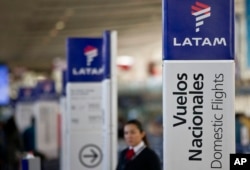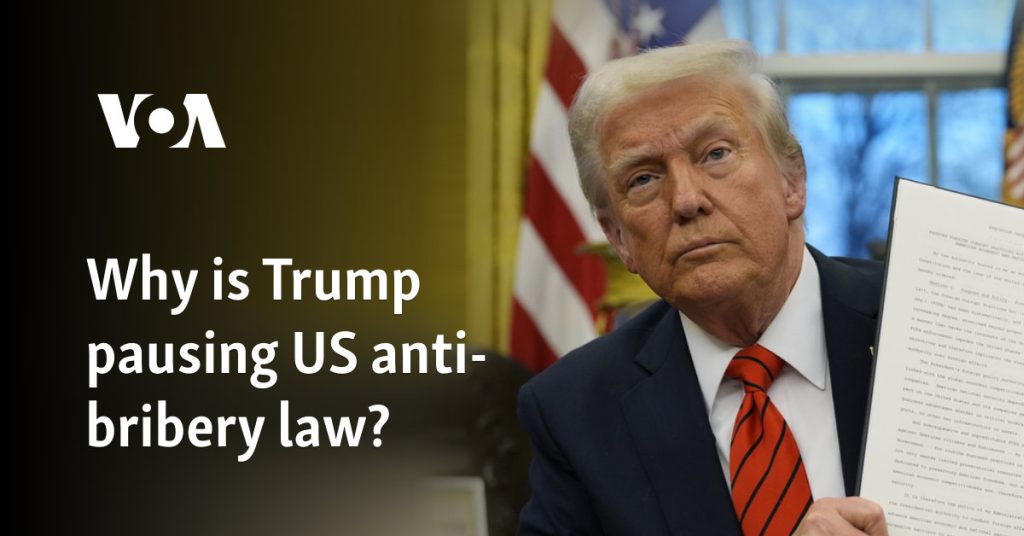U.S. President Donald Trump signed an executive order this week pausing almost all enforcement of a decades-old U.S. anti-bribery law.
The law, known as the Foreign Corrupt Practices Act, makes it illegal for both U.S. firms and foreign companies with a U.S. connection to bribe foreign officials.
Transparency advocates have credited the U.S. Justice Department’s vigorous enforcement of the law over the past two decades with curbing foreign corruption. Critics, including business leaders, however, have long complained that the law puts U.S. companies at a disadvantage in international markets where certain business practices are common.
Trump, a longtime critic of the FCPA, voiced those concerns during the Oval Office signing ceremony on Monday.
“It sounds good on paper, but in practicality it’s a disaster,” Trump said. “It means that if an American goes to a foreign country and starts doing business there legally, legitimately or otherwise, it’s almost a guaranteed investigation, indictment, and nobody wants to do business with the Americans because of it.”
Here is a breakdown of the law and the implications of the executive order for foreign bribery and U.S. business.
What is the FCPA?
The FCPA is a U.S. law that prohibits companies from providing cash payments or valuable gifts to foreign officials for business advantages. While the law exempts certain “facilitation payments,” it prohibits the use of third parties to make bribes.
The FCPA was enacted in 1977 following post-Watergate investigations that revealed widespread foreign bribery by U.S.-based multinational corporations. Congress, concerned about the impact on U.S. foreign policy and international standing, responded by criminalizing such practices, imposing prison terms and substantial penalties on violators.
Though initially focused on American companies, the law’s jurisdiction has expanded substantially. It now extends to any foreign business or individual with connections to the U.S. This broad reach enables prosecutors to pursue cases against foreign firms — for example, a Dutch company with a subsidiary based in Ohio accused of paying off Chinese officials through another subsidiary in Thailand.
The law has had a significant impact on the development of anti-corruption laws around the world. In 1997, the Paris-based Organization for Economic Cooperation and Development used the FCPA as a model for its Anti-Bribery Convention, which now has 46 member countries.
While enforcement of FCPA was negligible in the decades following its enactment, the early 2000s marked a significant shift. The Justice Department and the Securities and Exchange Commission, the two agencies responsible for enforcing FCPA’s provisions, ramped up enforcement, driven in part by emerging business scandals and new congressional requirements for corporate governance and financial reporting.
How has the law been used in recent years?
In recent years, U.S. foreign bribery law enforcement has been robust, with the Justice Department and the SEC opening nearly 174 investigations between 2018 and 2021. Last year, the Justice Department alone filed 17 enforcement actions under the law.
Latin America has emerged as a particular hot spot for U.S. investigators in recent years.
In 2016, two Brazilian companies agreed to pay a combined $3.5 billion after pleading guilty in a sprawling international foreign bribery case. U.S. authorities investigated the case in part because the illicit payments were made through U.S. bank accounts.

In 2020, Airbus SE, the European aircraft maker, agreed to pay nearly $4 billion to resolve foreign bribery charges brought in the U.S., Britain and France. Airbus admitted using intermediaries to bribe government officials and airline executives to win lucrative contracts in China and other countries.
In January 2024, SAP SE, a German software company with offices in the U.S., agreed to pay $220 million to resolve investigations into bribery payments to South African and Indonesia officials.
In December, AAR Corp., an Illinois-based aviation services company, agreed to pay more than $55 million to resolve investigations into bribery payments to government officials in Nepal and South Africa.
Several cases have involved India. In November, prosecutors charged three former employees of a Canadian institutional investor in connection with a bribery scheme involving Indian billionaire Gautam Adani and two other executives.
Why is Trump pausing FCPA enforcement?
Trump, a real estate tycoon-turned-president, has been a vocal critic of the law since well before his first term. In 2012, he called it a “horrible” and “ridiculous” statute that impeded U.S. companies’ ability to do business abroad.
Despite his criticism, FCPA enforcement actually surged during his first term in office, with 2000 marking a record-breaking year, according to the Morrison Foerster law firm.
The executive order frames the pause in enforcement as part of the president’s broader agenda to “advance American economic and national security by eliminating excessive barriers to American commerce abroad.”
The order says the FCPA’s scope has been “stretched beyond proper bounds and abused in a manner that harms the interests of the United States.” A White House fact sheet on the order released Monday says the “overenforcement” of the law harms U.S. companies and “infringes on the President’s Article II authority to conduct foreign affairs.”
This concern about aggressive enforcement isn’t new, said Mike Koehler, a law professor and leading authority on the FCPA, who noted that both Republicans and Democrats have raised similar issues over the past two decades.
“There has been a focus on the quantity of enforcement actions compared to the quality of those enforcement actions,” Koehler told VOA. “Enforcement has in many cases has gone so far off the rails that this law is being enforced in ways that do put companies at a competitive disadvantage.”
Transparency advocates, however, warn that suspending enforcement could deal a significant blow to global anti-bribery efforts.
“This pause will work to the advantage of unscrupulous business actors around the world who until now feared U.S. criminal pursuits,” Transparency International said in a statement calling on other OECD Anti-Bribery Convention members to increase their enforcement following the U.S. shift in policy.
What are the implications for investigating foreign bribery?
The executive order imposes a six-month freeze on foreign bribery investigations by the Justice Department. Almost all FCPA cases will be suspended while Attorney General Pam Bondi conducts a review and revises enforcement guidelines. The executive order gives Bondi discretion to extend the pause for an additional six months.
Bondi, however, has directed federal prosecutors to prioritize FCPA cases involving cartels and transnational criminal organizations.
And corporate lawyers were quick to caution clients that the executive order doesn’t give them free rein.
“Bribery is still illegal,” attorneys at the Arnold & Porter law firm wrote in an analysis of the executive order. “The FCPA remains on the books; Congress has not repealed it. And many other state, federal and foreign laws still prohibit bribery.”







